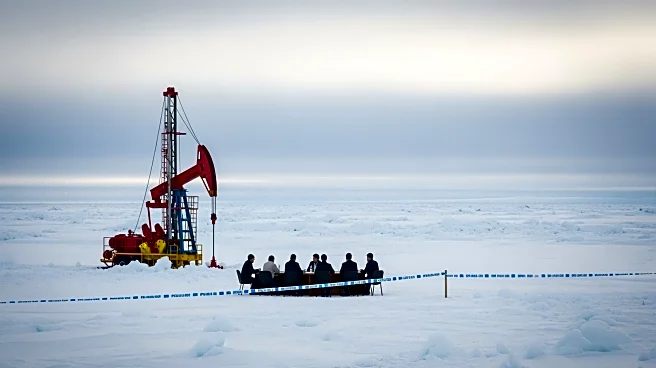What's Happening?
The Trump administration has announced plans to open the coastal plain of Alaska's Arctic National Wildlife Refuge for oil and gas leasing, reversing a previous decision by the Biden administration that
had restricted development in the area. Interior Secretary Doug Burgum stated that the agency is preparing to hold a lease sale this winter in the nearby National Petroleum Reserve. This move is part of President Trump's broader strategy to increase domestic fossil fuel production. The coastal plain is believed to contain billions of barrels of crude oil, although high costs have deterred many companies from pursuing drilling in the region. Environmentalists and native Alaskans have expressed concerns that oil development could threaten local wildlife, including arctic foxes, polar bears, and caribou.
Why It's Important?
The decision to open the Arctic National Wildlife Refuge to drilling has significant implications for U.S. energy policy and environmental conservation efforts. By prioritizing fossil fuel production, the Trump administration aims to bolster domestic energy independence and economic growth. However, this move has sparked criticism from environmental groups and indigenous communities who argue that it could lead to ecological damage and disrupt local ecosystems. The potential for oil extraction in the region also raises questions about the balance between economic interests and environmental stewardship, as well as the long-term impact on climate change initiatives.
What's Next?
The upcoming lease sale in the National Petroleum Reserve will be a critical test of industry interest in Arctic drilling. Oil companies may weigh the financial viability of operations against environmental and public relations concerns. Additionally, legal challenges from environmental organizations and native groups could arise, potentially delaying or altering the course of development. The Trump administration's decision may also influence future policy debates on energy production and conservation, as stakeholders assess the economic and ecological outcomes of Arctic drilling.
Beyond the Headlines
The opening of the Arctic National Wildlife Refuge to oil drilling highlights broader ethical and cultural considerations. The decision underscores the ongoing tension between economic development and environmental preservation, as well as the rights of indigenous communities to protect their ancestral lands. It also raises questions about the U.S.'s commitment to global climate change efforts, as increased fossil fuel production could undermine progress towards reducing carbon emissions. The long-term implications of this policy shift may affect international perceptions of U.S. environmental leadership.









